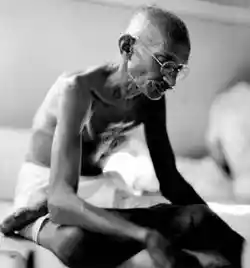Satyagraha beyond freedom
This day marks the clarion call given by Gandhi to the nation's spirit of unity and religious tolerance when he announced his last hunger strike. Also probably causing his assassination.

The picture depicts Gandhi's last peaceful protest - the hunger strike to stop communal violence; Image Source: Public Domain
Mahatma Gandhi has been the symbol of peaceful resistance in the world for years. Although the credit given to Gandhi is highly debated, no matter what, the contributions made by him cannot be denied. His journey from fighting colonial racism in South Africa to fighting British oppression in India has been inspirational.
A short bald man, clad in a single white dhoti walking with a stick and pioneering non -violent mass resistance remains the symbol of India's nationalism even after these many years. His calls for unity, non-cooperation, peaceful resistance and 'satyagraha' didn't just reach many but it saw the enormous response, with the British administration going haywire.
In the course of him being the face at frontline struggle, the 'Mahatma' observed fasts and hunger-strikes as an extremely effective tool to bend complete governments in front of him. And although this day marks the beginning of one of his many hunger strikes, it remains unique on a circumstantial basis.
In the prelude of the Indian independence and the Radcliffe line tearing up the subcontinent into three parts, unprecedented communal violence pursued. One of the biggest, most unplanned mass migration of population rendered thousands homeless, lost, raped, maimed. A sight beyond gory, with blood frenzy populations in the name of communalism.
The partition aimed to divide India on communal grounds with Pakistan belonging to Muslims and India to Hindus. Suddenly natives became strangers on their own lands. A nationwide horror was unfolding, the remnants still visible.
It was this violent reaction which eclipsed the dawn of independence for the 'Mahatma', and once more, today, he sat on a hunger strike at Birla House in Delhi. We often forget to see Gandhi's fast as a physical experience, but only as a political move, but this fast particularly, showed how weak he had become.
Gandhi laid down 7 demands, all in line to subdue the communally charged atmosphere of Delhi, which was accepted by a big section of representatives of citizens of Delhi on the fifth day of his fast. Gandhi's fast did bring about a significant shift in the communally struck Delhi.
Interestingly, this might sound as an appeasement to communal nationalist both today and then. A Muslim-favoring Gandhi had now certainly gained a section which despised him, which probably led to his assassination by a right-wing nationalist.


